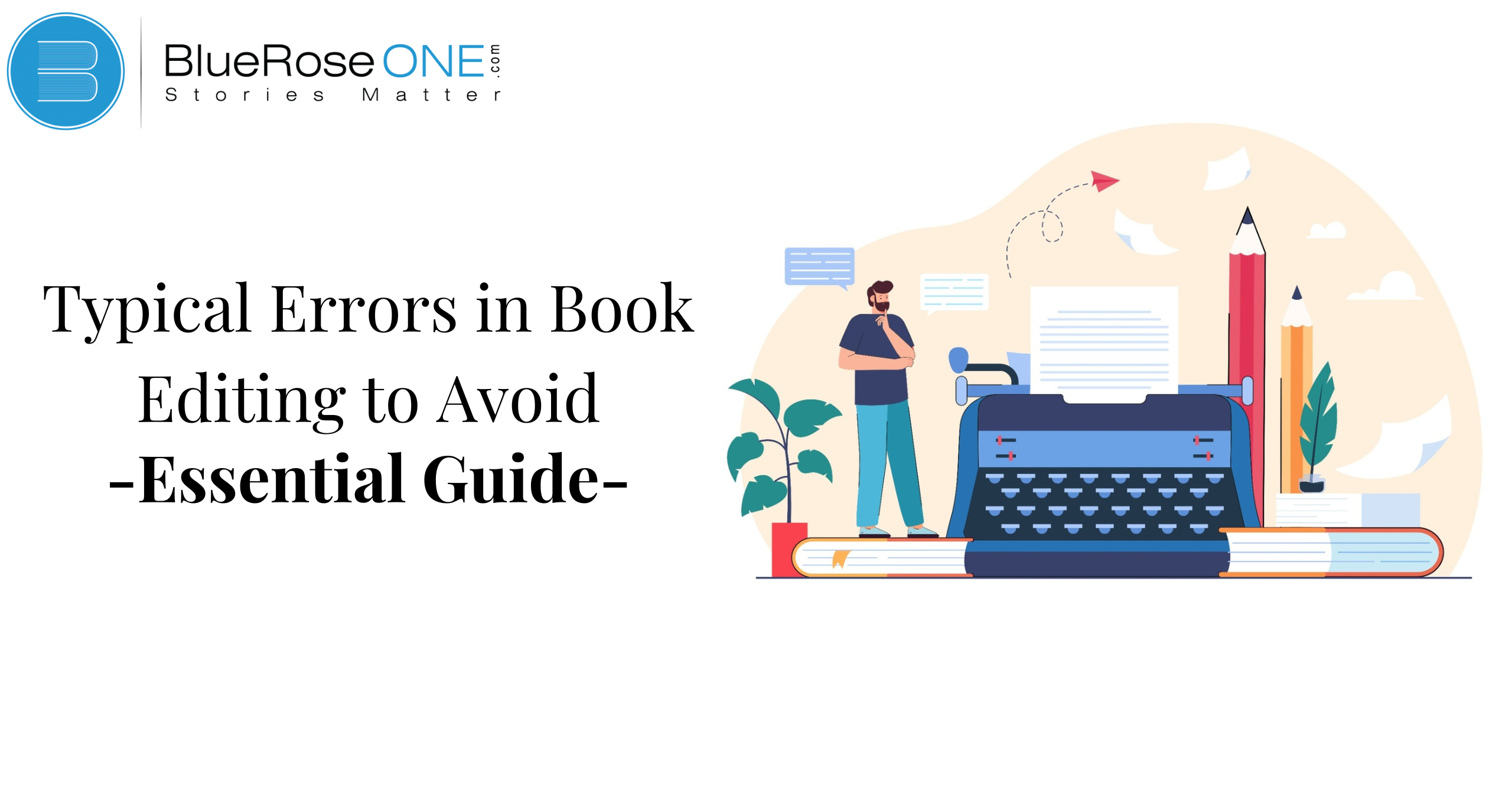Introduction
Book editing is a crucial step in the publishing process that occurs between finishing a manuscript and producing the finished product. It includes a number of procedures designed to improve the text’s general quality, coherence, and clarity. But in the rush of finishing a manuscript, writers sometimes forget about the crucial book editing stage, which can have negative effects on how well and widely their work is received.
Skipping the Editing Process
A crucial error that many prospective writers make is to skip the book editing process, particularly when it comes to book editing. Book editing involves more than just correcting typos and grammar; it also involves polishing the entire document to guarantee cohesion, consistency, and clarity.
If authors skip this important phase, they run the risk of giving readers a poor product, which will damage their credibility and reputation. Multiple rounds of revision, consulting with professional editors or beta readers for comments, and painstaking attention to detail are all necessary for effective book editing.
In the end, putting time and energy into the book editing process is crucial to creating a polished, expert work that appeals to readers.
Neglecting Structural Editing
In the world of book editing, neglecting structural book editing is a sin. This important stage deals with the overall structure of your manuscript, making sure that it makes sense and flows naturally. It’s the blueprint that creates the whole story world, but in the rush to perfect syntax or text, it gets neglected.
Disregarding structural book editing, however, can lead to a convoluted plot, a disconnected plotline, and uninterested readers. If writers skip this crucial stage, they run the danger of jeopardizing the accuracy and efficacy of their writing. Prioritize structural book editing as the cornerstone of your editing process to avoid this trap and create a strong basis for literary achievement.
Overlooking Copy Editing
For any author, neglecting copy editing can be a very serious mistake when it comes to book editing. Ignoring this important step might lead to a host of unnoticed mistakes, such as typos and grammatical problems, which will eventually lower the book’s overall quality. As the last coat of polish, copy editing guarantees consistency, professionalism, and clarity across the work.
Writers need to understand how important it is to polish their writing in order to satisfy readers’ expectations and industry standards. Authors can reach new heights with their work, enthralling readers and making a significant literary impact, by giving careful copy editing top priority.
Ignoring Proofreading
In the world of book editing, failing to proofread is a grave offense. It’s like throwing up the door for mistakes and inconsistencies to find their way into the finished product. However, a lot of prospective writers make this mistake, endangering the honesty and competence of their writing.
Ignoring proofreading can lead to awkward mistakes in grammar, spelling, and structure that make reading difficult for the reader. Adopting precise proofreading procedures is not only advised, but necessary in the exacting craft of book editing. It guarantees the well-polished appearance that sets a properly edited book apart from an unfinished manuscript.
Failing to Maintain Consistency
One of the most important—yet sometimes disregarded—aspects of book editing is uniformity across the manuscript. Inconsistencies in storytelling can cause readers to become perplexed and, eventually, diminish the overall quality of the book.
These variations, which can include inconsistent character attributes, inconsistent timelines, or stylistic changes, can make it difficult for the reader to fully immerse themselves in the narrative. Strict attention to detail is necessary for effective book editing, so that everything lines up perfectly from start to finish.
Editors can maximize the coherence and readability of the final product and bring the author’s work to the highest level by emphasizing uniformity.
Misusing Punctuation and Grammar
One of the most common mistakes authors make when editing their books is to utilize incorrect grammar and punctuation. This error can undermine a manuscript’s cohesion and clarity, confusing readers and lessening the work’s overall impact.
These mistakes, which can include an excessive dependence on commas, mixing up their, their, and they’re, or using a lot of run-on sentences, can damage the author’s authority and professionalism.
Plot and character development are important aspects of book editing, but it also requires careful attention to linguistic nuances so that punctuation and grammar support the reader’s experience rather than detract from it.
Disregarding Clarity and Flow
One of the most frequent errors in book editing is to ignore flow and clarity. The technical components of book editing, such as proofreading for spelling, grammar, and punctuation, can easily draw one’s attention away from the story’s overall coherence.
Effectively engaging readers and communicating the intended content, however, depends on keeping a steady flow and assuring clarity. Readers may become perplexed or completely lose interest in a story when clarity is impaired.
In a similar vein, a haphazard flow can ruin the reading experience and lessen the impact the author intended. Clarity and flow must therefore be given top priority during the book editing process in order to produce a book that is well-written and captivating.
Neglecting Fact-Checking
Failing to fact-check a manuscript is a grave sin in the book editing industry that can undermine its credibility. Many times, writers undervalue the significance of double-checking facts, believing that readers won’t see errors. But skipping this important stage might result in humiliating mistakes and damage the author-audience relationship.
A thorough examination of every aspect is necessary for effective book editing in order to guarantee that claims are supported by credible sources and supporting data.
Authors may maintain the integrity of their work and improve the reading experience by making fact-checking a priority during the editing process. This will help readers engage with the content on a deeper level.
Forgetting About Formatting
One prevalent mistake made in the book editing field is formatting forgetfulness. It’s simple to become bogged down in the nuances of syntax and style, but if you ignore how your work is presented, it will lessen its overall impact. Effective formatting guarantees professionalism and readability, allowing readers to follow your story with ease.
Ignoring it can lead to inaccuracies or even distracting discrepancies in the finished output. Every detail, including font selection and margins, is vital to the reader’s experience. By giving formatting equal weight with content improvement, writers can improve their writing and interact with readers more successfully.
Underestimating Feedback and Revision
One common error to avoid in the field of editing is to undervalue the influence of revision and feedback. Because they believe their first draft is perfect, authors sometimes fail to see the valuable feedback they receive from editors and beta readers.
However, a paper can be improved from decent to great by accepting constructive criticism and undergoing extensive rewriting. Feedback functions as a compass, assisting writers in the complex process of editing their work to guarantee cohesion, clarity, and reader resonance.
Ignoring this critical step puts the final product’s impact and quality at risk. As a result, accepting criticism and rewriting is essential to becoming an excellent book editor.
Rushing the Process
Rushing the process might be a very important error to avoid when it comes to editing. Although it can be tempting to rush through changes in an effort to meet deadlines or experience the rush of finishing something, doing so runs the danger of lowering the caliber of the finished work.
Editing a document in a hurry might result in mistakes being missed, consistency issues being ignored, and improvement possibilities being lost. Instead of rushing through the editing process, authors should emphasize thoroughness and attention to detail.
It is ensured that the book reaches its full potential and connects with readers on a deeper level by taking the time to meticulously review and polish every component of it.
Lack of Attention to Detail
When it comes to book editing, ignoring details might be a grave error. Both authors and editors need to be on the lookout for details to make sure the manuscript is thoroughly examined.
Paying insufficient attention to details can result in formatting problems, grammatical mistakes, and inconsistent story or character development, all of which negatively impact the reader’s experience.
Typos and improper punctuation are examples of seemingly small errors that can have a big impact on the book’s overall quality. Consequently, in order to edit the document to perfection and provide readers with a coherent, error-free end product, painstaking attention to detail is essential.
Overediting
Overediting is a common mistake made by authors when editing books. The author’s voice and original intent may be lost as a result of this rigorous examination of each word and phrase. Editors must balance the need to improve the text while maintaining the spirit of the author’s style.
Excessive book editing might produce a bland, lifeless text that lacks individuality. Editors should concentrate on improving coherence, consistency, and clarity without restricting the author’s inventiveness in order to avoid falling into this trap.
Editors may guarantee that the final result maintains its authenticity and appeals to readers by knowing when to stop being overly literal in their revisions and when to be constructive.
Conclusion
To sum up, while navigating the editing process can be intimidating, success in publishing depends on avoiding frequent blunders. Prioritizing linguistic accuracy, structural integrity, and meticulous attention to detail allows authors to make sure that their works are well-received by
















